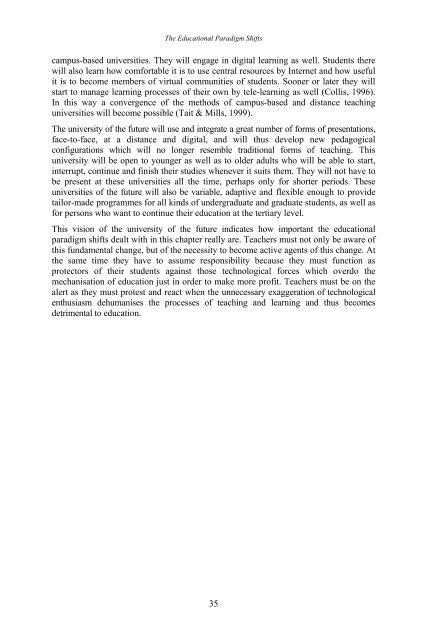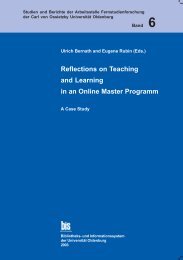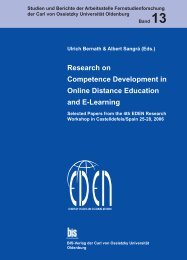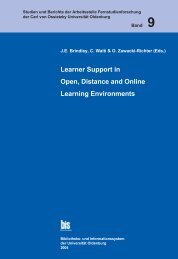- Page 1 and 2: Studien und Berichte der Arbeitsste
- Page 3 and 4: Studien und Berichte der Arbeitsste
- Page 5 and 6: Acknowledgements Chapter 1: “Grow
- Page 8 and 9: Series Editors' Foreword In 1994, D
- Page 10 and 11: Foreword by Fred Lockwood As an edu
- Page 12 and 13: Introduction Owing to the exponenti
- Page 14 and 15: 1 Growing Importance of Distance Ed
- Page 16 and 17: Growing Importance of Distance Educ
- Page 18 and 19: Growing Importance of Distance Educ
- Page 20 and 21: Growing Importance of Distance Educ
- Page 22 and 23: Growing Importance of Distance Educ
- Page 24: Growing Importance of Distance Educ
- Page 27 and 28: The Educational Paradigm Shifts Eve
- Page 29 and 30: The Educational Paradigm Shifts the
- Page 31 and 32: The Educational Paradigm Shifts �
- Page 33 and 34: The Educational Paradigm Shifts eng
- Page 35: Perspectives The Educational Paradi
- Page 39 and 40: Concepts and Models The True Nature
- Page 41 and 42: Concepts and Models relevant data a
- Page 43 and 44: The Multiple (Mass) Media Model Con
- Page 45 and 46: Concepts and Models The Network-Bas
- Page 48 and 49: 4 Online Learning: Visions, Hopes,
- Page 50 and 51: Online Learning: Visions, Hopes, Ex
- Page 52 and 53: Online Learning: Visions, Hopes, Ex
- Page 54 and 55: Online Learning: Visions, Hopes, Ex
- Page 56: Online Learning: Visions, Hopes, Ex
- Page 59 and 60: Part I Digitised Learning Environme
- Page 61 and 62: Digitised Learning Environments: Ne
- Page 63 and 64: Digitised Learning Environments: Ne
- Page 65 and 66: Digitised Learning Environments: Ne
- Page 67 and 68: Digitised Learning Environments: Ne
- Page 69 and 70: Digitised Learning Environments: Ne
- Page 71 and 72: Digitised Learning Environments: Ne
- Page 73 and 74: New Learning Spaces have become com
- Page 75 and 76: New Learning Spaces appliances, the
- Page 77 and 78: New Learning Spaces According to Ma
- Page 79 and 80: New Learning Spaces � The objects
- Page 81 and 82: New Learning Spaces time they can t
- Page 83 and 84: New Learning Spaces hall, cafeteria
- Page 85 and 86: New Learning Spaces instruction in
- Page 87 and 88:
A Pedagogical Model for Using Virtu
- Page 89 and 90:
A Pedagogical Model for Using Virtu
- Page 91 and 92:
A Pedagogical Model for Using Virtu
- Page 93 and 94:
A Pedagogical Model for Using Virtu
- Page 95 and 96:
A Pedagogical Model for Using Virtu
- Page 97 and 98:
A Pedagogical Model for Using Virtu
- Page 99 and 100:
A Pedagogical Model for Using Virtu
- Page 101 and 102:
A Pedagogical Model for Using Virtu
- Page 103 and 104:
A Pedagogical Model for Using Virtu
- Page 105 and 106:
A Pedagogical Model for Using Virtu
- Page 108 and 109:
8 Moderating a Virtual Seminar - Re
- Page 110 and 111:
Moderating a Virtual Seminar (5) Wh
- Page 112 and 113:
Moderating a Virtual Seminar observ
- Page 114 and 115:
Moderating a Virtual Seminar Disadv
- Page 116 and 117:
Moderating a Virtual Seminar learn
- Page 118 and 119:
Moderating a Virtual Seminar result
- Page 120 and 121:
Moderating a Virtual Seminar Among
- Page 122 and 123:
Moderating a Virtual Seminar admini
- Page 124 and 125:
Moderating a Virtual Seminar lady s
- Page 126 and 127:
Moderating a Virtual Seminar 1. Lea
- Page 128 and 129:
Appendix 2: Moderating a Virtual Se
- Page 130 and 131:
9 "Information" and "Knowledge" - O
- Page 132 and 133:
"Information" and "Knowledge" - On
- Page 134 and 135:
"Information" and "Knowledge" - On
- Page 136 and 137:
"Information" and "Knowledge" - On
- Page 138 and 139:
"Information" and "Knowledge" - On
- Page 140 and 141:
"Information" and "Knowledge" - On
- Page 142 and 143:
"Information" and "Knowledge" - On
- Page 144 and 145:
"Information" and "Knowledge" - On
- Page 146 and 147:
"Information" and "Knowledge" - On
- Page 148 and 149:
"Information" and "Knowledge" - On
- Page 150 and 151:
"Information" and "Knowledge" - On
- Page 152 and 153:
"Information" and "Knowledge" - On
- Page 154 and 155:
"Information" and "Knowledge" - On
- Page 156 and 157:
"Information" and "Knowledge" - On
- Page 158 and 159:
10 Pedagogical Consequences of the
- Page 160 and 161:
Pedagogical Consequences of the Tra
- Page 162 and 163:
Pedagogical Consequences of the Tra
- Page 164 and 165:
Pedagogical Consequences of the Tra
- Page 166 and 167:
Pedagogical Consequences of the Tra
- Page 168 and 169:
Pedagogical Consequences of the Tra
- Page 170 and 171:
Pedagogical Consequences of the Tra
- Page 172 and 173:
Pedagogical Consequences of the Tra
- Page 174 and 175:
Pedagogical Consequences of the Tra
- Page 176:
Pedagogical Consequences of the Tra
- Page 179 and 180:
The Pedagogical Flexibility of the
- Page 181 and 182:
The Pedagogical Flexibility of the
- Page 183 and 184:
The Pedagogical Flexibility of the
- Page 185 and 186:
The Pedagogical Flexibility of the
- Page 187 and 188:
The Pedagogical Flexibility of the
- Page 189 and 190:
The Pedagogical Flexibility of the
- Page 191 and 192:
The Pedagogical Flexibility of the
- Page 193 and 194:
The Pedagogical Flexibility of the
- Page 195 and 196:
The Pedagogical Flexibility of the
- Page 197 and 198:
The Pedagogical Flexibility of the
- Page 199 and 200:
The Pedagogical Flexibility of the
- Page 201 and 202:
Conclusion The Pedagogical Flexibil
- Page 204 and 205:
12 The Transformation of the Univer
- Page 206 and 207:
The Transformation of the Universit
- Page 208 and 209:
The Transformation of the Universit
- Page 210 and 211:
The Transformation of the Universit
- Page 212 and 213:
The Transformation of the Universit
- Page 214 and 215:
The Transformation of the Universit
- Page 216 and 217:
13 Visions of Autonomous Learning T
- Page 218 and 219:
Visions of Autonomous Learning many
- Page 220 and 221:
Visions of Autonomous Learning 3.2.
- Page 222 and 223:
Visions of Autonomous Learning �
- Page 224 and 225:
Visions of Autonomous Learning �
- Page 226 and 227:
Visions of Autonomous Learning syst
- Page 228 and 229:
Visions of Autonomous Learning It i
- Page 230 and 231:
Visions of Autonomous Learning proc
- Page 232 and 233:
Visions of Autonomous Learning �
- Page 234:
Visions of Autonomous Learning tech
- Page 237 and 238:
References Barcena, E., & Read, T.
- Page 239 and 240:
References Bruner, J. S. (1966). To
- Page 241 and 242:
References Duning, B. (1993). The c
- Page 243 and 244:
References Gibbons, M., Limoges, C,
- Page 245 and 246:
References Höfling, S. & Mandl, H.
- Page 247 and 248:
References Kenworthy, B. (2000). Di
- Page 249 and 250:
References Mansell, R., & Wehn, U.
- Page 251 and 252:
References Peters, O. (2002). Infor
- Page 253 and 254:
References Ryan, Y. (2001). The pro
- Page 255 and 256:
References Tergan, S.-O., Harms, U.
- Page 258 and 259:
Name Index Aebli, Hans: 138, 158 Al
- Page 260 and 261:
Mannheim, Karl: 137 Mansell, Robin:
- Page 262 and 263:
a-synchronism, a-synchronicity: 82,
- Page 264 and 265:
digitisation, digitalisation: 11, 4
- Page 266 and 267:
hypertext: 21, 31, 32, 33, 40, 44,
- Page 268 and 269:
computer-based: 92; with computer n
- Page 270 and 271:
"learning by research": 197, 198, 1
- Page 272 and 273:
search engine: 64, 95, 142, 188 sea
- Page 274 and 275:
University 2005: 51 University of G





